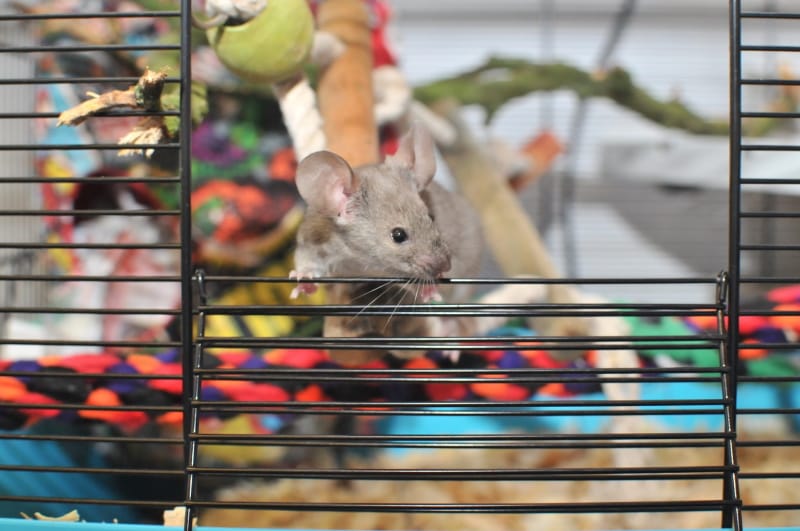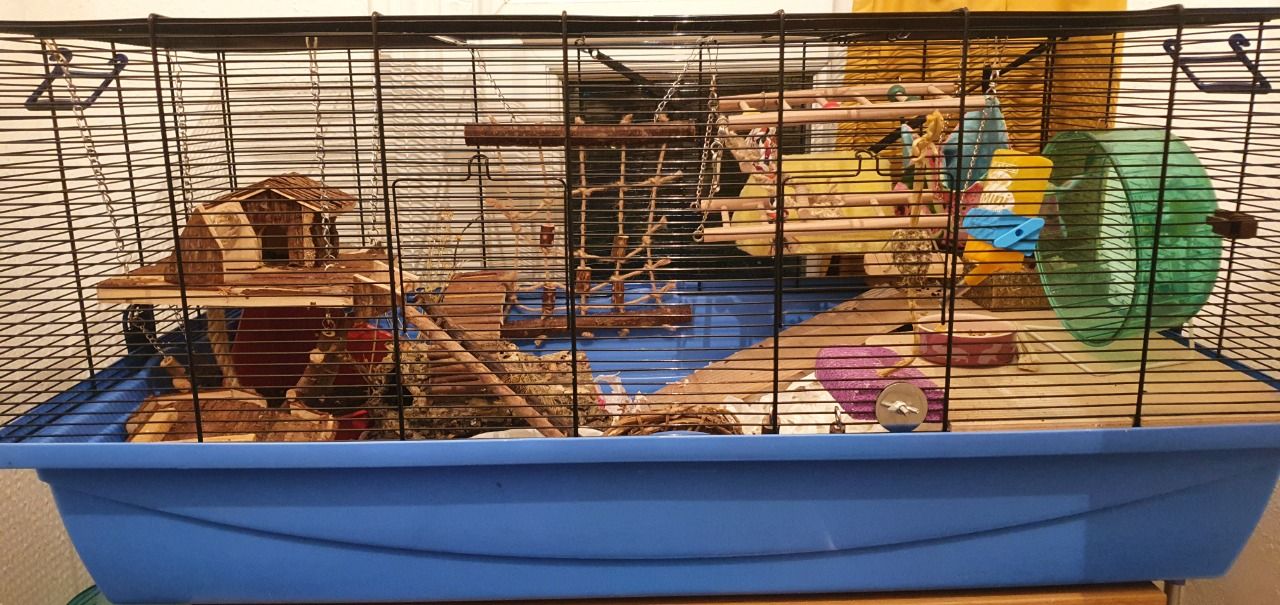General Information:
The most commonly kept pet mouse is the domesticated house mouse; informally referred to as fancy mice. They have an lifespan ranging from 1 ½ - 2 ½ years. They're intelligent and can make challenging but good pets.
We've found the care of fancy mice to be one of the most controversial subjects in keeping pet rodents or "pocket pets" (a term we don't appreciate); socialisation, diet, and housing are all hot topics and you'll find the information you receive varies massively among individuals.
Care:
Housing/Enrichment:
Glass tanks are a great enclosure for pet mice so long as they have adequate ventilation. Minimum tank sizing should be around 4ft by 1ft, depending on the amount of mice you're housing.
Barred cages are a good alternative for mice. Please check that the bar-spacing is no larger than 1cm otherwise your mouse could escape. For a pair of mice, aim for a minimum of L 80cm x W 50cm.
In the wild, mice are very active and spend their time climbing, foraging and exploring. Creating an environment that allows them to display these behaviours is paramount. Provide your mouse with things to chew, things to climb, and space to run around and play. Allow access to solid-floored wheels that are a minimum of 28cm in diameter.
Mice are prone to respiratory issues. High levels of ammonia (ammonia occurs as a result of urea breaking down) can aggravate and even trigger the onset of diseases as there is a positive correlation with increased ammonia (25–250 ppm) and mycoplasma pulmonis lung infections. We recommend a dust-free paper/cardboard bedding that reduces odour.
Mice will scent mark with urine and other bodily secretions to familiarise themselves with their environment and communicate with other mice. Although a good choice of bedding will help, you must practice good hygiene; this is called a prophylactic measure; prophylactics are actions or medication taken to prevent disease.
Their urine has a distinctive and potent odour (particularly the urine of an entire male mouse) for this reason, we also recommend frequent spot cleans and deep cleans:
Useful Links:
The most commonly kept pet mouse is the domesticated house mouse; informally referred to as fancy mice. They have an lifespan ranging from 1 ½ - 2 ½ years. They're intelligent and can make challenging but good pets.
We've found the care of fancy mice to be one of the most controversial subjects in keeping pet rodents or "pocket pets" (a term we don't appreciate); socialisation, diet, and housing are all hot topics and you'll find the information you receive varies massively among individuals.
Care:
Housing/Enrichment:
Glass tanks are a great enclosure for pet mice so long as they have adequate ventilation. Minimum tank sizing should be around 4ft by 1ft, depending on the amount of mice you're housing.
Barred cages are a good alternative for mice. Please check that the bar-spacing is no larger than 1cm otherwise your mouse could escape. For a pair of mice, aim for a minimum of L 80cm x W 50cm.
In the wild, mice are very active and spend their time climbing, foraging and exploring. Creating an environment that allows them to display these behaviours is paramount. Provide your mouse with things to chew, things to climb, and space to run around and play. Allow access to solid-floored wheels that are a minimum of 28cm in diameter.
Mice are prone to respiratory issues. High levels of ammonia (ammonia occurs as a result of urea breaking down) can aggravate and even trigger the onset of diseases as there is a positive correlation with increased ammonia (25–250 ppm) and mycoplasma pulmonis lung infections. We recommend a dust-free paper/cardboard bedding that reduces odour.
Mice will scent mark with urine and other bodily secretions to familiarise themselves with their environment and communicate with other mice. Although a good choice of bedding will help, you must practice good hygiene; this is called a prophylactic measure; prophylactics are actions or medication taken to prevent disease.
Their urine has a distinctive and potent odour (particularly the urine of an entire male mouse) for this reason, we also recommend frequent spot cleans and deep cleans:
- Spot cleaning should be performed every other day. It involves removing soiled bedding and cleaning dirty cage accessories. Bare in mind that over-cleaning and removal of scent marks can be stressful to mice.
- Deep cleaning should be performed every 7-10 days depending on the number of mice in the enclosure, and the size of the enclosure. Deep cleaning involves removing and cleaning all toys and bedding. Once the cage is empty, thoroughly clean and disinfect the cage.
Useful Links:
- https://www.bargain-pet-supplies.co.uk/shop/barney-hamster-cage-blue-100x54x45cm/
- https://www.vetsend.co.uk/trixie-plastic-exercise-wheel/?var=13537&gclid=Cj0KCQjw0K-HBhDDARIsAFJ6UGheaRWN9NwLyw-6L8APaPIrMyky-F3G2gvUAguKa4MpDuvBhsYYGb8aAsd0EALw_wcB
- https://www.ikea.com/gb/en/p/detolf-glass-door-cabinet-white-80269122/
Socialising:
Mice are social creatures and need companionship.
Mice have unique options when it comes to socialising. Normally, we wouldn't recommend housing different species of rodents together, however, some species of mice can cohabit with different species of mice.
In the wild, you would usually have a single breeding male house mouse sharing a habitat with numerous females reproducing at will.
Female mice live very well amongst their own kind, whereas unaltered males can be territorial, even fatally aggressive, towards each other.
Keeping male mice creates a dilemma. Male house mice need companionship as much as females.
You have three options:
Useful Links:
Diet:
Mice are omnivorous rodents who're estimated to eat 20 times per day. We recommend scatter-feeding their food as it simultaneously provides them with enrichment whilst encouraging them to use their natural instinct when foraging.
Mice can be fed on commercial pet foods provided they’re nutritionally sound. Check for:
Please feel free to ask more questions.
Mice are social creatures and need companionship.
Mice have unique options when it comes to socialising. Normally, we wouldn't recommend housing different species of rodents together, however, some species of mice can cohabit with different species of mice.
In the wild, you would usually have a single breeding male house mouse sharing a habitat with numerous females reproducing at will.
Female mice live very well amongst their own kind, whereas unaltered males can be territorial, even fatally aggressive, towards each other.
Keeping male mice creates a dilemma. Male house mice need companionship as much as females.
You have three options:
- Castration: Neutering your male mouse will allow him to live amongst females and/or other castrated of his own species without reproducing. Many people note that mice are very risky with anaesthesia. There are complications commonly associated with small mammals during surger (hypothermia, blood loss, respiratory depression etc). however, with a good vet and veterinary team, the risks have been minimal IME with all mice being resocialised after surgery.
- Multimammates: House mice cannot breed with Multimammates. Keeping a male mouse with 2 or more multimammates allows you to provide companionship without surgical intervention. Personally, this should be a last resort in a rare case castration hasn't worked, or isn't possible at all. Multimammates are no easy pet rodent to keep and require an experienced handler. It's also far more beneficial to have same-species companionship.
- Cohabiting with other suitable exotic species of mice (requires experience and caution).
Useful Links:
- www.vetline.de/castration-of-adult-male-c57bl6jrj-mice-allows-for-resocialization-and-social-housing-of-previously?fbclid=IwAR2050veiPrTXukxdA6edCkpHXSVGp3g8uBwmNc2xIT0xe3K-YmSAMRkJZ0
- www.ncbi.nlm.nih.gov/pmc/articles/PMC3894646/?fbclid=IwAR1CBNiBSnHc-mJPeVRY3eVLDpFhSsoSb6ekpLM_QnYUmNIXTmzXN-H55Yk
Diet:
Mice are omnivorous rodents who're estimated to eat 20 times per day. We recommend scatter-feeding their food as it simultaneously provides them with enrichment whilst encouraging them to use their natural instinct when foraging.
Mice can be fed on commercial pet foods provided they’re nutritionally sound. Check for:
- Protein shouldn’t exceed more than 14% (12%-14% is acceptable)
- 5-8% crude fat
- Under 10% crude fibre.
Please feel free to ask more questions.



